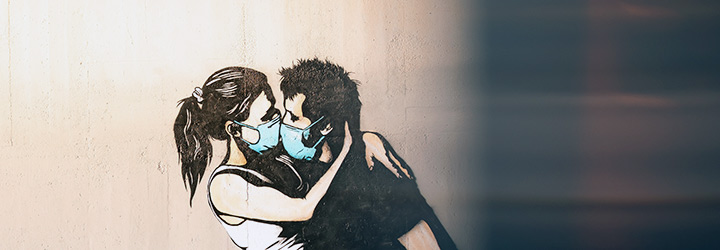Arctivists: art and activism against repression during the COVID-19 crisis

The Centre for Applied Human Rights (CAHR), through a grant from the Open Society Foundations, is supporting activists and artists across the world responding to the outbreak of Covid-19 and its implications for human rights defenders, activism, and shrinking civic and political space. Many governments have used COVID-19, and their response to the virus, as a cover to crack down on political opposition and civil society, as well as human rights defenders and activists. At the same time, the emergency has bred new responses and new forms of both local and global solidarity.
CAHR recognises that collaborative endeavours between activists and artists have the potential to provide innovative responses to the current COVID-19 emergency, whether in a reactive, therapeutic or imaginative form.
Since the Call for Proposals was issued in April 2020 we have had more than 9,200 unique visitors to the HRD Hub website from 98 countries and more than 19,700 pageviews. We have received 496 applications which have been reviewed by the HRD Hub Research Associate and the HRD Hub Co-ordinator to make sure they meet the criteria detailed in the Call for Proposals.
How are projects selected? There are four key criteria that we assess that are found here https://www.hrdhub.org/arctivists. We have been quite generous in our shortlisting so far putting almost half of the proposals we have received forward to the review panel. To date, the panel has reviewed 222 proposals. The review panel consists of the 2 staff members of the Hub, the chair of CAHR's advisory board, the director of CAHR and an artist who CAHR has collaborated with on several projects - Emilie Flower. (https://www.picastudios.co.uk/emillie-flower)
We have now funded 26 projects from 21 countries in Southeast Asia, South Asia, the Middle East, Africa, South and Central America, the Caribbean and Europe. The funded projects cover repressive measures introduced by states in lockdown (global, India), environmental issues (Malwai, Brazil), women's rights (Mexico, Turkey), workers rights (El Salvador, Philippines), migrant and refugee rights (Greece, India, Indonesia), and indigenous rights (Peru, Brazil). One of the first projects funded has been selected for two exhibitions (Hangar in Lisbon and the Latitudes Online Art Fair) and another has been shortlisted (Indonesia). The Arctivism project we are funding in Lesvos that gathers stories from refugees at the frontline of the European humanitarian crisis has secured additional funding from the European Cultural Foundation. We have been asked to speak about the project as part of the Art and Social Activism course at the University of Santander.
How do you decide how much to give? The Call recommends applicants apply for between £1,000-£2,000 but can apply for up to £3000. Budgets are reviewed by the panel and where necessary we have asked applicants to resubmit with more detail and justification for spending. The review of budgets is informed by Emilie's experience of working with artists across the globe and in some cases she has recommended we ask applicants to re-submit with a lower or higher budget.
Future plans: The first call related to Arctivists is now closed. We are taking stock, with a view to releasing a second call later in the year (funding permitting). A second call is likely to continue to support artist/activist collaborations during Covid-19 and its immediate aftermath. We may also seek to fill gaps in our coverage so far. These gaps are geographical (Middle East, China, Central Asian Republics); in terms of the organisations reached (grassroots and rural organisations); and thematic (we may change or adapt the focus, for example, to look at creative ways of supporting protection and managing risk).
Piergiuseppe Parisi states: “The response to this call has been overwhelming. It indicates the very real need, both in terms of supporting subsistence and resilience, and champions creative responses to COVID-19-related crackdowns. CAHR has responded swiftly to fund innovative and imaginative responses to this double crisis.”
Find out more about our current Arctivists' projects and follow us on Twitter for more updates.
The Politics of Displacement project explores the dynamics of displacement and reintegration of identities during the period of COVID-19. It is an interdisciplinary project encompassing performance, visual, sound and speech, and it interrogates the dynamics of site, place and culture using art at a tool for social change and a coping mechanism.
This project is a collaboration between Mgibe, whose work confronts prejudices, advocates against social inequality and creates a platform for critical self-reflexivity within spaces, and visual artist Lihle Menziwa.
